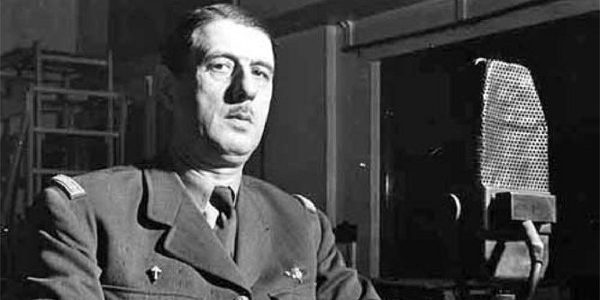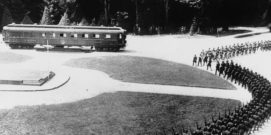Éric Zemmour has precisely that lean and hungry look that made Caesar think that Cassius did not sleep at nights.
Why America Needs de Gaulle
Charles de Gaulle began his famed War Memoirs with the remarkable line,
Toute ma vie, je me suis fait une certaine idée de la France.
(All my life, I have had a certain idea of France.)
That idea, however, was far from simple. Originally written in the aftermath of the Second World War and published across several volumes between 1954 and 1959, the memoirs themselves were written with an eye toward a calamitous past and a tempestuous present.
The war had been completely disastrous for France—not just materially but in terms of national honor, as nearly a millennium of martial valor was seemingly erased in the span of a bad week in 1940. And it left behind deep political rifts only widened by the then-ongoing process of decolonization. These would prove highly destabilizing, toppling the Fourth Republic and threatening worse as rightwing paramilitary organizations sought to bring the violence of colonial warfare home to France itself.
To match the divided reality of postwar France, de Gaulle put forward a unifying idea of his nation: one that could paper over social and political divisions that went back not just years but centuries. As Julian Jackson details in his magisterial biography of de Gaulle, his certaine idée de la France was an idiosyncratic one.
What was noteworthy about de Gaulle’s patriotism was not simply its depth or ardor but its breadth: it brought together otherwise incompatible elements of France’s tradition, achieving an image of concord that was rarely to be found in the history itself. His syncretic vision was grand enough to encompass figures and movements that were opposed in their own times: the ancien régime and the Revolution, the Sun King and Danton, the Grand Condé and Lazare Hoche. From Clovis to, well, de Gaulle himself, he imagined a kind of unbroken chain of memory strong enough to incorporate schisms and conflict into an overall whole of ineffable francité.
This all might sound dreamy and quixotic but for the fact that his vision really did capture something of France that a more particularistic one would miss. A purely revolutionary or traditional-conservative account of France would present as incomplete a picture of the country as one which left out Burgundy or Aquitaine.
Moreover, de Gaulle found in this vision rich and powerful conceptual resources that would sustain him through the war years in London, when he alone claimed the legitimate representation of France; then through his subsequent period of political exile; and finally, during his prime ministership, when in the face of deep national political divisions (along with over two dozen assassination attempts), he stewarded the country through the economic successes of the Trente Glorieuses.
The outstanding question is whether Gaullist patriotism really took hold beyond de Gaulle himself. As professional Francophile Adam Gopnik noted: “In forty years of passing in and out of France, I have almost never heard him pointed to as an exemplar useful in any way for today’s crises.”
But precisely because it need not actually require a de Gaulle, this peculiar version of patriotism may have some relevance to America today. Of course, we are not in the kind of trough where de Gaulle found his nation’s fortunes in 1940: our homeland remains unoccupied by foreign powers, our military remains preeminent, our dollar remains the global reserve currency, and so on. Moreover, our success with creating and disseminating vaccines in response to the COVID pandemic, while hardly exclusive, nonetheless gives testament to the ingenuity and resources that remain at America’s disposal.
And yet it is clear enough that we are in a bad way. Our national divisions—partisan, regional, generational, cultural, and racial—are as clear as ever, and in many ways starker against the background of a lengthy period of relative peace and prosperity. Moreover, these divides, in typically American fashion, have a way of opening up basic questions about the nature of our country: the legitimacy of its founding, the legacy of slavery, and its worthiness of our loyalty and affection as citizens.
Thus the New York Times’ famed 1619 Project did not just seek to shed greater light on historical crimes, but to treat those crimes as coextensive with the establishment of America itself. This may not necessarily rule out patriotic attachments altogether, but it makes them contingent upon a particular vision of progress.
Meanwhile, its response, the Trumpian 1776 Project, has come in for a fair bit of criticism, but its problem is not its laudatory interpretation of U.S. history; it is that it has made American nationalism another front in the endless culture war. As such, embracing that history, with all it entails, becomes a partisan move, associated with a particular faction instead of appealing to the country as a whole, as de Gaulle was wont to do.
Perhaps the trickiest problem for national history is: what do we do with great crimes and their perpetrators? Above all the crimes associated with the founding and origins of countries? Balzac’s maxim that behind every great fortune lies a crime was already taken as a political truism long before the 1619 Project was conceived.
He exhibited no sentimentality toward partisans of the far-right or far-left, and his stature was such that he could largely avoid paying lip service to their grievances.
In his Conclusion to Leviathan, Hobbes warns against either excessive scrutiny or excessive justification of the past. His point is that no political community in history can display a blameless past—much less blameless beginnings—and peace and stability require a mutual disagreement to disregard such events in favor of living well in the present.
Yet de Gaulle was one of the least Hobbesian men of modern times; devoted to church and nation in a way that could hardly be defended on mere instrumental grounds. And perhaps we too are closer to de Gaulle in our unwillingness to treat citizenship as something merely transactional. We remain deeply concerned with the character of the country we belong to and which belongs to us. The trouble is that the prevailing concern with moral history of the nation is essentially negative; it can only tear down and despair. Meanwhile, the right-wing response is only superficially positive; it has had difficulty formulating an independently appealing account of American patriotism that is not posed as a reaction to progressive critiques. Both are thus exclusive in a way that Gaullist patriotism is not.
The genius of de Gaulle’s patriotism was not just that it placed country over faction, but that it was able to see the representatives of opposing factions as incarnating a common national character even at the very moment that they clashed with one another. As Madison would be quick to remind us, factionalism and partisanship aren’t going anywhere, but perhaps it might be possible to follow de Gaulle’s example when it comes to assessing our shared history.
For us, this means seeking to identify the common American threads that connect past figures of the past to one another and to ourselves, even when they are various ways uncongenial. This means not just the easy ones like Lincoln and Douglass and Tubman, or the Founders (who are becoming less easy), but the harder and stranger ones too.
We should be able to envision an “Americanness” that is capacious enough to take in Confederate battlefield leaders touched with an eccentric tactical brilliance like Jackson and Lee, as well as black nationalists like Stokely Carmichael and Huey Newton. Great warriors like Ruben Rivers and Smedley Butler, but also staunch pacifists like Jane Addams and Smedley Butler. Do they not all incarnate in their own ways the American genius?
Is this a hopeless mish-mash? Perhaps. But as another Frenchman, Ernst Renan, famously remarked, historical error is an essential factor in the creation of a nation. Our goal here is not foolish consistency but grand synthesis. At a time in which our national self-conception risks becoming excessively cramped and restricted, we should strive for an expansive and large-spirited sense of our past. And doing so does not require bowdlerizing our history, no more than de Gaulle’s patriotism required white-washing the bloody excesses of the French Revolution.
Of course, even the most magnanimous vision must have its limits if it is to avoid becoming simply insipid. De Gaulle ultimately elected to commute the death sentence of the aged Petain but was otherwise properly ruthless about executing Vichyites (and, later, high-ranking OAS members). In later years, he would crush the protests of May 1968, once these turned destructive, even employing the highly Machiavellian tactic of using disgraced former OAS members to do so.
He exhibited no sentimentality toward partisans of the far-right or far-left, and his stature was such that he could largely avoid paying lip service to their grievances. At most, his rhetoric could veer into studied ambiguity—as with his infamous statement to the masses of Algerians and pieds-noirs: “Je vous ai compris!” Here too, however, he was prepared to jettison colonial commitments as these came to threaten France’s larger interests.
By the same token, a prudential version of American patriotism ought not be a universally inclusive ideal. To stand for something other than its own perpetuation, it must be prepared to make ethical distinctions. But if it is to be any kind of patriotism, it needs to have a care for what it leaves in; it cannot rely simply upon destructive iconoclasm if it is to catch the political imaginations of citizens. Perhaps for this reason, so many across the country recently took note of what might have otherwise been a local news story, when an Atlanta high school previously named after Nathan Bedford Forrest (a Confederate Army general and the most prominent early member of the Ku Klux Klan) was renamed to honor baseball great Hank Aaron. That is to say, a highly divisive figure was replaced by a quintessentially American one—indeed one whose very status served as a refutation of what the former stood for. There is a poetry here that reflects something of the Gaullist vision.
One hastens to add the obvious caveat: a more generous national self-understanding will not end political and economic squabbles, and nor should it. Such conflict is the stuff of politics, and it is wholly appropriate for citizens in a country of 330-plus million to enter into disputes over matters of political substance. The strength of Gaullist nationalism is that it might allow us to return to our political contests without continually reopening the national question.
Of course, perhaps this all seems excessively Gallic, ill-suited for a New World country like ours, not to mention incoherent and even paradoxical. So be it. To paraphrase no less American a figure than Walt Whitman, we are a large country, and we too contain multitudes.


